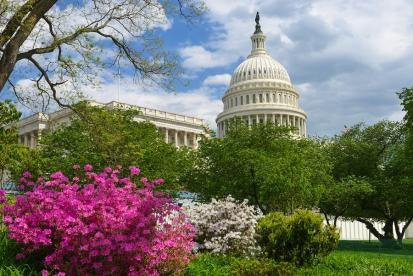Legislative Activity
House Approves FY 2017 Appropriations Bill Decreasing FCC’s Budget
On July 7, the U.S. House of Representatives (House) passed H.R.5485, the Financial Services and General Government Appropriations Bill 2017 containing appropriations for fiscal year (FY) 2017. The $21.7 billion funding measure contains appropriations for various federal agencies for the fiscal year ending September 30, 2017, including appropriations for the Federal Communications Commission (FCC). Specifically, the bill provides an appropriation of $314,844,000 for the FCC, representing a cut of approximately $69 million below FY 2016 enacted levels and $43 million below the FCC’s requested amount for FY 2017.
The bill contains a number of restrictions and conditions on the FCC’s use of the appropriated funds. For example, the bill prevents the FCC from using its appropriation to “implement, administer, or enforce” the FCC’s Open Internet Rules until all litigation pertaining to the rules has been resolved. The bill also prevents the FCC from taking action in its set-top box proceeding until 180 days after the completion of a study that “evaluates the potential costs and benefits of the proposed rule and the potential costs and benefits of other market-based solutions.” According to the Committee Report, the House Committee on Appropriations (House Appropriations Committee) believes that the FCC’s set-top box proposal “falls short, especially with regard to privacy and copyright concerns.” Finally, the bill requires the FCC to submit quarterly reports to the House Appropriations Committee, the Senate Committee on Appropriations, the House Committee on Energy and Commerce (House Commerce Committee), and the Senate Committee on Commerce, Science, & Transportation (Senate Commerce Committee) informing the committees of the status of the FCC’s efforts in tracking and collecting monetary penalties assessed by the FCC through its enforcement process within 90 days after enactment of the bill.
Senate Commerce Committee Passes Network Resiliency Bill
On June 29, the Senate Commerce Committee passed S.2997, the Securing Access to Networks in Disasters (SANDy) Act of 2016 by voice vote. The bill, previously discussed here, was introduced on May 26 by Sen. Maria Cantwell (D-WA). The legislation would require the FCC to commence proceedings related to the resiliency of telecommunications networks during times of emergency. The bill also expresses a sense of congress that “[s]evere weather and emergencies can have devastating effects on communities” and directs the Government Accountability Office to conduct a study on how federal agencies can “better ensure critical telecommunications networks remain operational during times of emergency.” The bill now goes to the full Senate for consideration.
This Week’s Hearings:
-
Tuesday, July 12: The Communications and Technology Subcommittee of the House Commerce Committee will hold a hearing entitled “Oversight of the Federal Communications Commission.” All five FCC commissioners will testify at the hearing.
-
Tuesday, July 12: The Senate Commerce Committee will hold a hearing entitled “How Will the FCC’s Proposed Privacy Regulations Affect Consumers and Competition?” Witnesses at the hearing will include Dean C. Garfield, President and CEO of the Information Technology Industry Council, The Honorable Jon Leibowitz, Partner at Davis Polk & Wardwell and the Co-Chair of the 21st Century Privacy Coalition, Matthew M. Polka, President and CEO of the American Cable Association, and Professor Peter Swire, Huang Professor of Law and Ethics at Georgia Institute of Technology’s Scheller College of Business.
Regulatory Activity
FCC Announces Final Agenda for July 14 Open Meeting
The FCC has announced that the following items are on the agenda for the agency’s July 14 Open Meeting:
-
Use of Spectrum Bands Above 24 GHz For Mobile Radio Services et al.: The FCC will consider a Report and Order and Further Notice of Proposed Rulemaking that would “make spectrum in bands above 24 GHz available for flexible use wireless services, including for next-generation, or 5G, networks and technologies.”
-
Technology Transitions et al.: The FCC will consider a Declaratory Ruling, Second Report and Order, and Order on Reconsideration that “adopts a framework to guide transitions to next-generation communications technologies while protecting the interests of consumers and competition.”
On June 23, FCC Chairman Tom Wheeler posted to the FCC Blog discussing the items above. The FCC’s Open Meeting will commence on July 14 at 10:30 a.m. in the Commission Meeting Room of the FCC’s headquarters at 445 12th Street, S.W., Washington, D.C., and will be streamed live at fcc.gov/live.
FCC Exempts Federal Government and Federal Contractors from TCPA Calling Restrictions
On July 5, the FCC issued a Declaratory Ruling clarifying that “the TCPA does not apply to calls made by or on behalf of the federal government in the conduct of official government business, except when a call made by a contractor does not comply with the government’s instructions.” In pertinent part, the TCPA prohibits any “person” from “mak[ing] any call . . . using any automatic telephone dialing system or an artificial or prerecorded voice . . . to any telephone number assigned to a . . . cellular telephone service” unless the caller has the “prior express consent of the called party,” with certain exceptions. In the Declaratory Ruling, the FCC determined that the “federal government or agents acting within the scope of their agency under common-law principles of agency” are not “person[s]” for purposes of the TCPA’s calling restrictions. The FCC explained that a federal contractor may invoke this TCPA exemption “when the contractor has been validly authorized to act as the government’s agent and is acting within the scope of its contractual relationship with the government, and the government has delegated to the contractor its prerogative to make autodialed or prerecorded- or artificial-voice calls to communicate with its citizens.”
FCC Commissioner Pai Sends Letters to Four State Utility Commissions Requesting Assistance to Combat Waste, Fraud, Abuse in Lifeline Program
On July 5, FCC Commissioner Ajit Pai sent letters to the President of the California Public Utilities Commission, Chair of the Public Utility Commission of Oregon, Chairman of the Public Utility Commission of Texas, and Commissioner of the Vermont Public Service Department (collectively, “State Utility Commissions”) seeking their “aid in combating the waste, fraud, and abuse that has riddled the Universal Service Fund’s Lifeline program since wireless resellers began participating in this program.” Lifeline is a government subsidy program overseen by the FCC that provides discounted phone service to low-income consumers. Commissioner Pai previously raised concerns about “waste, fraud, and abuse” in the Lifeline program and requested information from Chris Henderson, CEO of the Universal Service Administrative Company (USAC) – which administers the Lifeline program – in letters sent April 18, May 31, and June 8.
Commissioner Pai’s letters to the State Utility Commissions raise particular concern about potential abuse from “duplicate subscribers (that is, individuals getting multiple subsidies).” Commissioner Pai explains that although there is a “one-per household” rule for Lifeline subsidies, there is also an “override” under which a “duplicate determination” can be overridden by an “applicant” or, potentially, an “unscrupulous wireless reseller” with “no USAC oversight.” As Commissioner Pai explains, the FCC in April “proposed a $51 million forfeiture against Total Call Mobile” after the FCC “learned how Total Call Mobile[] . . . repeatedly registered duplicate subscribers” and that “at one point, 99.8% of Total Call Mobile’s new subscribers were the result of overrides.” Commissioner Pai also notes that “USAC has reported that at least 16 other major Lifeline wireless resellers may have employed the same tactics as Total Call Mobile.” Commissioner Pai states that the purpose of his letter is to “alert [the State Utility Commissions] to some of the abuses [the FCC] has seen” in the Lifeline program because California, Oregon, Texas, and Vermont are the four states that “run their own Lifeline accountability databases,” according to the letters. Commissioner Pai also requested certain information from the State Utility Commissions, including information about their override and audit procedures relating to the Lifeline program.
FCC Enters Consent Decree with GCI Related to Wireless 911 Outages
On July 6, the FCC’s Enforcement Bureau (Bureau) entered into a Consent Decree with General Communication, Inc. (GCI) to resolve its investigation into whether GCI, “in connection with five separate 911 outages in its wireless network between August 2008 and April 2016, failed to deploy a 911 system with sufficient safeguards to ensure the completion of 911 calls, failed to timely notify emergency call centers in relation to three of these outages, and failed to timely submit outage reports to the Commission in relation to four of these outages.” During its investigation, the Bureau determined that the service outages actually prevented significant numbers of wireless customers from reaching first responders when making 911 calls, and that the outages could have been minimized or avoided had GCI simply implemented appropriate safeguards. As part of the settlement, GCI admits that it violated the Commission’s 911 service reliability and outage notification and reporting rules, and agrees to pay a $2.4M penalty, in addition to implementing a compliance plan. The Bureau notes that in determining the penalty, it took into account the fact that “four of the five outages took place in remote locations in Alaska.





 i
i


